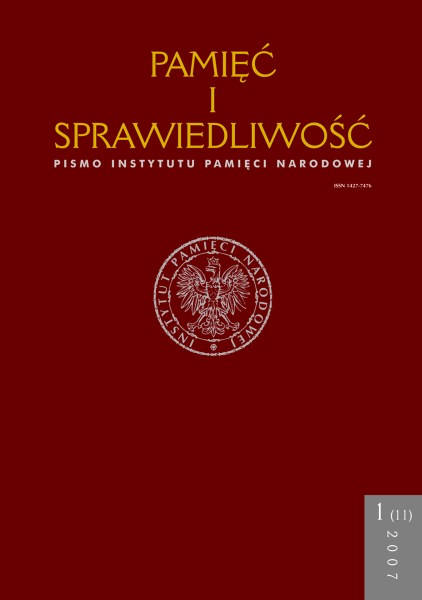Jest tylko jedna Polska. Bolesław Świderski – emigrant w służbie Polski Ludowej
Pamięć i Sprawiedliwość, Tom 11 Nr 1 (2007), strony: 273-308
Data publikacji: 2007-12-30
Abstrakt
Polish communist intelligence worked on the large group of emigree activists and politicians. It managed to enroll some of them for co-operation. Bolesław Świderski was one of the enrolled. He was a known editor, bookseller and journalist
in “Polish” London. In the interwar period he was connected with the nationalistic movement, he was a member of National Radical Camp Falanga (ONRFalanga). During the occupation he was kept in Nazi concentration camps. After the war he emigrated to Great Britain. In 1949 he established his own bookselling company. Świderski’s bookshop was one of the fi rst places, where one could buy not only emigration publications, but also books and magazines from the homeland. In 1955 Świderski opened a publishing house, which soon became one of the biggest publishers in “Polish” London. After the Polish October 1956 he began to demonstrate his pro-communist views, which led to severance of his contacts with political emigration. In 1958 he started co-operating with PRL intelligence. Four years later a fi rst issue of “Kronika” was published. This magazine was finansed by Ministry of Internal Affairs. “Kronika” was a kind of a socio-cultural weekly magazine, adressed to a wide target. The magazine was to be a germ of a group with “positive” attitudes towards Polish communistic authorities. In his colums Świderski would give one-sided and extremely critical opinions on emigration leaders. Soon he began not only attacking “Polish” London, but also praising Communistic Poland, glorifying Polish communistic political elite, playing for Russia and expressing anti-German phobia. A coalition with Russia was to guard Poland against danger from Gernany. Using patriotic ideas, “Kronika” opposed the division between emigration and homeland. The editor-in-chief of the magazine tried to convince readers that despite different world-views, the interest of Poland requires co-operation of the emigration and homeland. In articles published in “Kronika” Świderski negated rationality of political emigration. He asked the emigration to be reasonable, to accept the reality and to accept the permanence of post-war layout of forces. Świderski died in London in April 1969. Just before his death he had been planning to come back to Poland. He did not manage. Two years later the last issue of “Kronika” appeared.
Inne teksty tego samego autora
- Krzysztof Tarka, „Jest typem dość sympatycznym”. Józef Retinger i wywiad cywilny PRL , Pamięć i Sprawiedliwość: Tom 35 Nr 1 (2020)
- Antoni Józef Bohdanowicz, Władysław Bułhak, Andrzej Friszke, Małgorzata Ptasińska-Wójcik, Krzysztof Tarka, [Dyskusja] Stan badań nad emigracją i źródła do jej dziejów , Pamięć i Sprawiedliwość: Tom 15 Nr 1 (2010)
- Krzysztof Tarka, Nauka, polityka i tajne służby. Podróże Adama Bromkego do Polski , Pamięć i Sprawiedliwość: Tom 16 Nr 2 (2010)
- Krzysztof Tarka, Działalność Karola Lewkowicza – przyczynek do powstania orientacji prokrajowej na emigracji , Pamięć i Sprawiedliwość: Tom 15 Nr 1 (2010)
- Krzysztof Tarka, Waldemar Sobczyk i „Nasz Znak” – dywersja w ruchu ludowym na emigracji , Pamięć i Sprawiedliwość: Tom 18 Nr 2 (2011)
- Krzysztof Tarka, Anna Cichocka, [Recenzja] Krzysztof Tarka, Emigracyjna dyplomacja. Polityka zagraniczna rządu RP na uchodźstwie 1945–1990, Oficyna Wydawnicza RYTM, Warszawa 2003, ss. 315 , Pamięć i Sprawiedliwość: Tom 6 Nr 2 (2004)
- Krzysztof Tarka, Reglamentowana odwilż. Obóz "zamkowy" na emigracji wobec wydarzeń w Polsce i bloku komunistycznym w 1956 roku , Pamięć i Sprawiedliwość: Tom 28 Nr 2 (2016)
- Krzysztof Tarka, W oczekiwaniu na wyzwolenie. Rząd Rzeczypospolitej Polskiej na uchodźstwie o sytuacji międzynarodowej na przełomie lat czterdziestych i pięćdziesiątych , Pamięć i Sprawiedliwość: Tom 2 Nr 2 (2002)
 Język Polski
Język Polski
 English
English
 Deutsch
Deutsch
 Français (France)
Français (France)
 Italiano
Italiano
 Русский
Русский


 PDF
PDF
